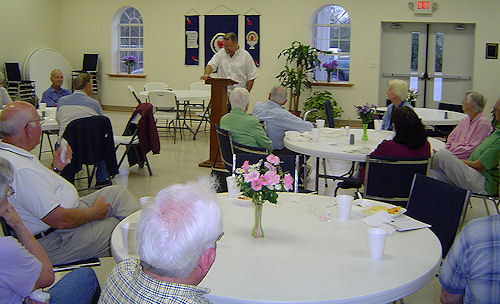
You don't just get a new kidney. Until a transplant is available, life depends on dialysis. Hemodialysis requires elaborate equipment and a person in end-stage renal disease goes to a center for the cleansing of body tissues via dialysis machine several times a week. Peritoneal dialysis can be accomplished at home with less elaborate equipment, but the end result is the same: life by machine because there is no functioning kidney. A diet for a person on dialysis is restrictive. And there are limitations on fluid intake. "I didn't realize how much weight I acquired while on dialysis which was related to fluid retention. The process of weight growth is very slow and insidious. My weight has really dropped since I received my new kidney," Forsman said.
"You have to have good health for a transplant." Forsman had to have a stable heart for a year after his heart surgery before anyone would enroll him in a kidney transplant program. He was enrolled in his first transplant program in the Fall of 2007 when he "applied at Ochsner Clinic in New Orleans. There were 300 people on the waiting list for a renal transplant. On my first day there for the initial work-up they took 17 vials of blood and five x-rays." There was a second transplant program in Birmingham with 3000 people on the waiting list. "I enrolled there too. They took only 16 vials of blood there." And he enrolled in a third program as well with pretty much the same procedure. Moreover, "the donor has to go through the same work-up. Every doc has to certify both of you are okay."
With the number of folks waiting for transplantation, there is a long wait for an appropriate organ. The problem is this: "You can't know when they will find an organ match for you. And when they do find that match, you have to be in virtually perfect health to receive the transplant." Donors can be recruited from friends, family, and others. Or a kidney may be donated because of a life catastrophe. In the meantime, support of friends and family is important. "I am so thankful to my wife Rene," Forsman said.
"I got my call at 3 AM in the morning in November 2008. My kidney match was very 'close' in terms of tissue match. That's important, because the closer the match, the less the amount of anti-rejection medications you need after the transplant. I left immediately and got to Ochsner as soon as I could. Surgery took seven and a half hours. I had 50 stables to hold my incision together. The kidney started working while I was still on the operating table! I was in the hospital for five days. Yes, I had a morphine button there, but I had no pain that couldn't be managed. It is typical to live close to the hospital for up to 15 weeks after transplant surgery as medications are balanced. They take blood every day. There was a residence inn about five minutes from Ochsner, so I was close to them," Forsman reported.
"There were some limits on our cooking. And I had to drink five liters of water a day. That means urination about every two hours. They adjusted medications." It was a busy time, but the tissue match was so good that Tom was back to Silverhill in about a month!
"God truly directed this process. I literally had people praying for me around the world. As my doc said, 'Prayer works.' I have a new life. And there's no restriction on coffee." Picture tongue in cheek at this point, "You don't know how important that coffee is to a Swede in Silverhill!"





